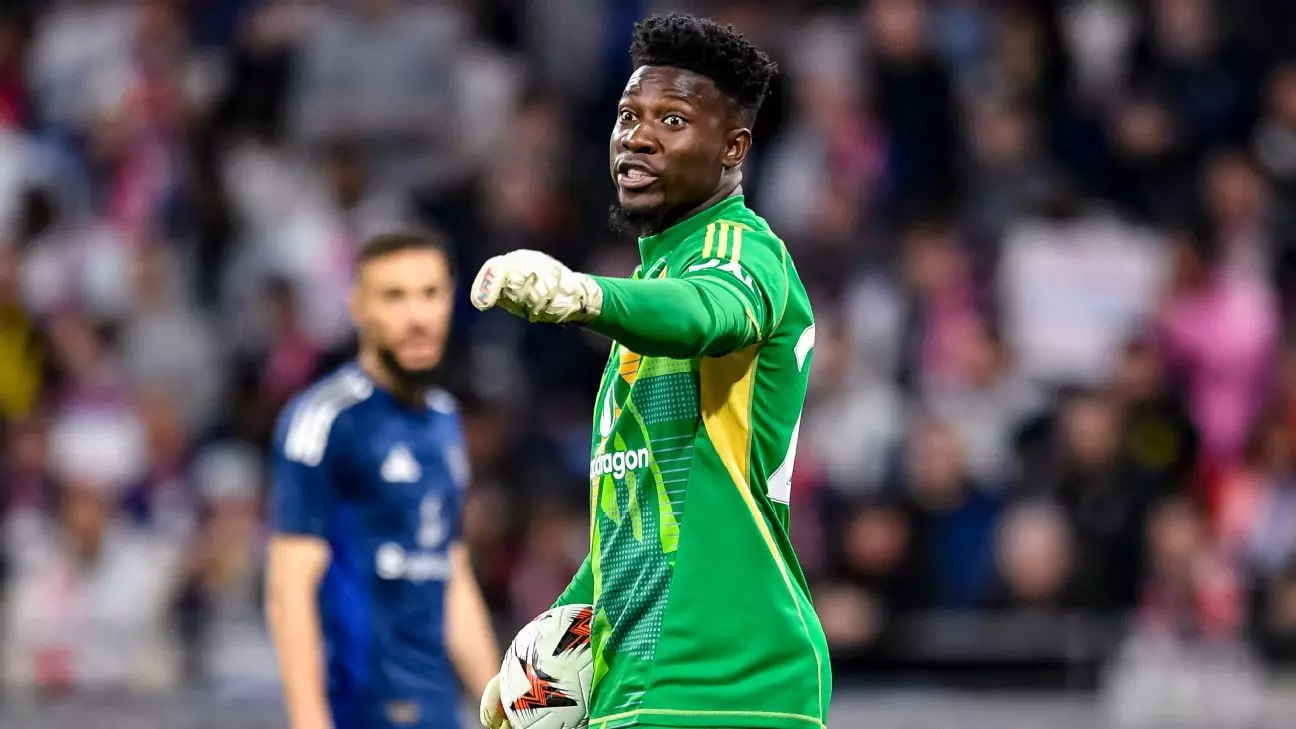In an enthralling UEFA Europa League quarterfinal first leg, Lyon and Manchester United produced a 2-2 spectacle that left fans on the edge of their seats. However, beneath the drama lay a tale that primarily revolved around Andre Onana’s missteps, which overshadowed some genuine footballing brilliance. The Cameroonian goalkeeper faced relentless scrutiny after presenting Lyon with two critical goals, particularly in a high-stakes environment where every blunder is magnified. His performance was so stark that, just a day prior, he had been criticized as “one of the worst goalkeepers in United’s history,” a label that hung over him throughout the match.
As two opposing players engaged in an escalating war of words, Onana’s comment that Manchester United were “way better” than Lyon appeared to unleash an unpredictable storm. The Serbian midfielder, Nemanja Matić, seized the moment, utilizing Onana’s bravado to fuel his own performance. What seemed like a standard fixture became a pulsating contest of mental warfare, with Onana at the center of it all.
The situation became dire for Onana when his mistakes not only led to goals but also transformed the atmosphere in Groupama Stadium. Lyon’s fans, who had vocalized their disdain minutes before, iterated further disdain after each of his gaffes, creating a toxic environment for a player who was evidently struggling under pressure. His confidence, fragile from previous matches, seemed to erode right before our eyes.
A Team Reflection: Amorim’s Challenge
In the post-match reflection, Ruben Amorim, the tactician in charge of United, offered a subdued analysis of the ordeal. His philosophical demeanor revealed insight into the pressure cooker that is elite football; mistakes are simply part of the game. “If you look at the season, I make more mistakes than them during these last games,” he stated, implying an understanding of the human side of the sport. However, this calm façade belied an urgent need to rectify Onana’s performance. With the second leg looming, there is little time to rebuild trust; the uncertainty surrounding Onana’s place in the team is palpably felt both on and off the pitch.
Amorim’s comments illuminated his frustration; brushing aside questions regarding Onana indicated how every misplaced ball can shift the coach’s strategic focus. Instead of riding a wave of potential, the team now faces a crossroads scenario where doubt has infiltrated the ranks. The former confidence of a squad that felt invincible in moments quickly devolved into a narrative dominated by individual errors, particularly the two attributed to Onana.
This struggle for unity resonates with players who perceive the clouds of dissatisfaction that surround Onana’s performance. Such tension impacts team dynamics; teammates likely feel the ripple effect of one man’s mistake echoing through the ranks. Furthermore, the pressure intensifies as individuals look not just to redeem themselves, but to ally with their beleaguered goalkeeper.
The Setting: A Tale of Two Teams
United’s resilience, as displayed through goals from Leny Yoro and Joshua Zirkzee, reflects both tactical superiority and the ability to exploit Lyon’s weaknesses. In stark contrast to Onana, who faltered at crucial junctions, United’s other players took pivotal moments in stride. Rasmus Højlund, underwhelming throughout the match, lends credence to the idea that not every player shines amidst adversity, but the collective efforts of the squad kept United in contention.
Lyon, meanwhile, took heart not only from their two goals but from the belief that they could seize future opportunities. Their last-minute equalizer struck a psychological blow, giving them momentum heading into the decisive match at Old Trafford. If Lyon carries this revived spirit into the second leg, it stands to reason that they will capitalize again on any lapse from Onana, an emergence from the edge embraced and exacerbated by the foibles of their opponents.
In the end, football is not only about individual excellence but also the collective response to moments of vulnerability. Onana’s mistakes are grave; they may define not just this match but the trajectory of the players and coaching staff moving forward. The “next game” mentality Amorim spoke of is crucial in maintaining focus and steering away from individual errors that threaten to unravel the team entirely. Every note of criticism heaped upon Onana serves as a reminder of the razor-thin margins that define victory and defeat in modern football.

